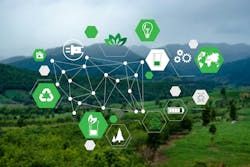Overcoming Scope 3 Emissions: Collaborative Approaches for Supply Chain Decarbonization
Key Highlights
- Scope 3 emissions are a challenge due to the lack of supplier data availability.
- Transportation, one of the largest Scope 3 categories, is both a barrier and an area that presents opportunities.
- The positive news is that more than half of businesses report high confidence in meeting their sustainability goals.
While the word sustainability might not be as omnipresent, companies need to make their sustainability goals explicit. This is the conclusion of the report, "State of Supply Chain Sustainability 2025," issued on October 28 by the MIT Center for Transportation & Logistics and the Council of Supply Chain Management Professionals (CSCMP).
Businesses that do have explicit goals are far more likely to embed them into daily decisions and invest in high-impact initiatives.
This year’s study, which was based on responses from 1,200 professionals in 97 countries, found that Scope 3 emissions remain the defining challenge. The problem stems from the lack of supplier data availability. The study notes that tracking the emissions requires data-intensive work and is heavily dependent on supplier collaboration. "Without access to activity-level or product-specific data, even motivated businesses struggle to calculate accurate emissions," the study says.
Improvement might come in the form of more sophisticated tools, closer supplier engagement, and industry collaborations that align standards. As far as collaboration is concerned, the authors state that research consortia can ensure that different entities in the supply chain (i.e. upstream and downstream) start working together.
The report noted that transportation, one of the largest Scope 3 categories, is both a barrier and an area that presents opportunities. "Companies are prioritizing operational efficiency today while investing selectively in low-emission technologies. Biofuels provide near-term impact, battery-electric is gaining traction where operationally feasible, and hydrogen holds promise for the longer term. The diversity of approaches underscores a pragmatic sequencing of action: solve what can be solved now, while preparing for the breakthroughs of tomorrow."
The authors found that the findings this year were optimistic in that more than half of businesses report high confidence in meeting their sustainability goals. Furthermore, those with public commitments and transparent reporting are the most likely to embed sustainability into daily decision-making.
"The path forward will not be uniform across regions or industries, but the path forward is clear. Sustainability is now embedded in business strategy, supply chain management, and investment decisions. By continuing to strengthen supplier partnerships, adopt innovative tools, and collaborate across sectors, companies can not only meet their climate commitments but also unlock new sources of efficiency, resilience, and growth."
